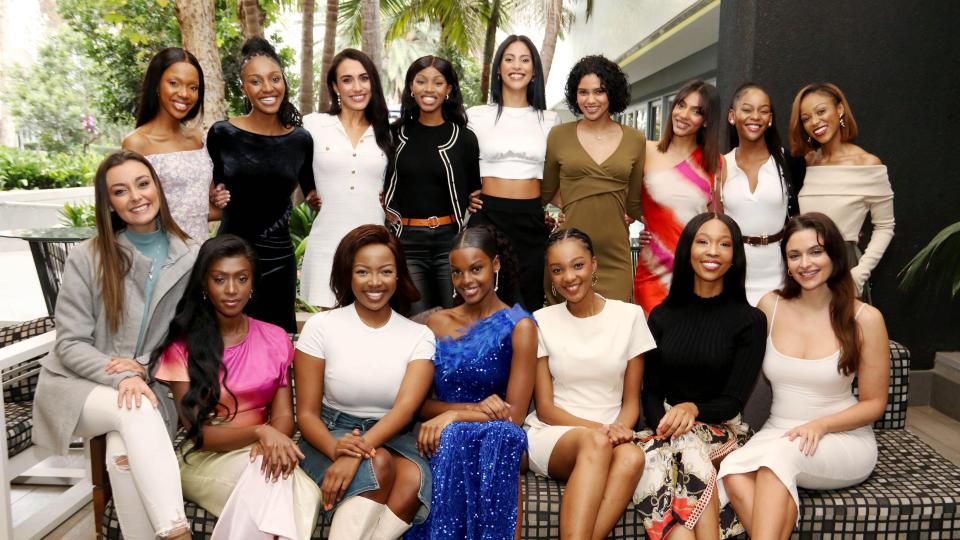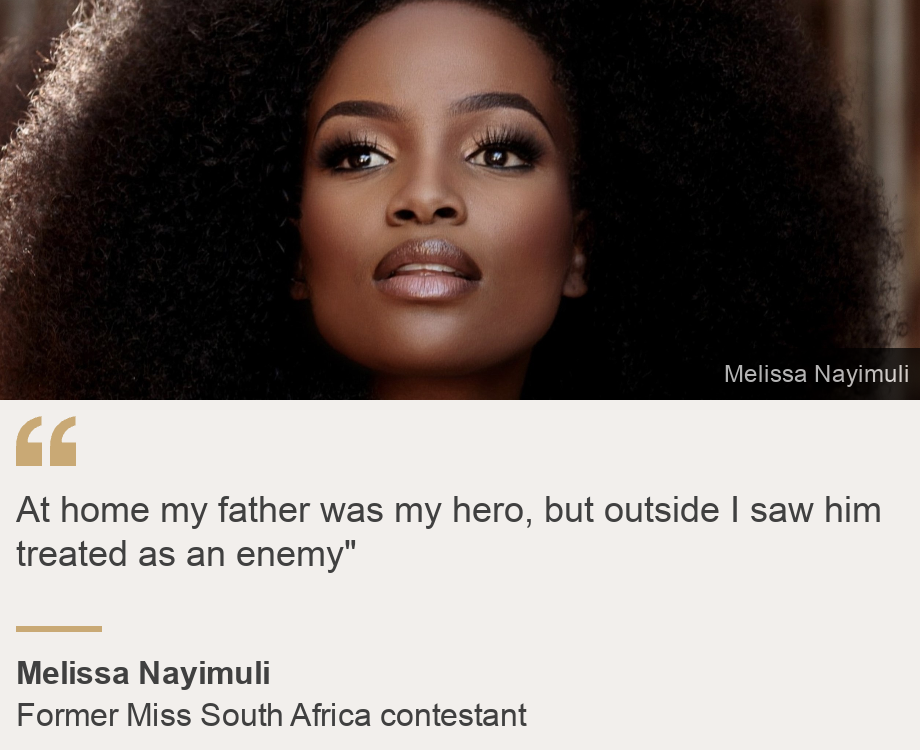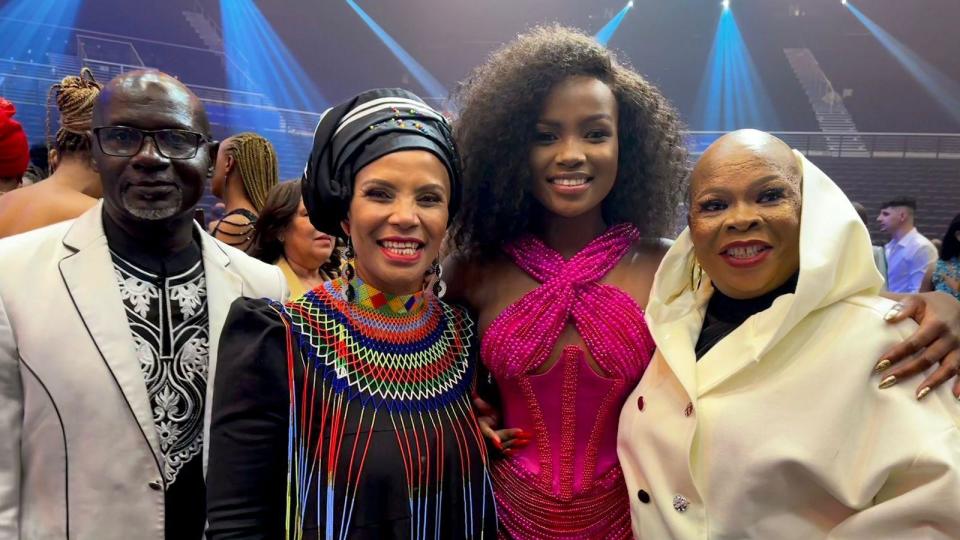When law student Chidimma Adetshina won the coveted spot as a Miss South Africa finalist, her triumph triggered a violent backlash, unearthing a layer of xenophobia that is close to the surface for some in the country.
The 23-year-old’s name suggests her connection to Nigeria, but internet sleuths wanted to know more and scoured every inch of her life. They discovered that her father is Nigerian and although her mother is South African, her family came from neighboring Mozambique.
“On behalf of South Africans, we do not recognize her and that name! She better start packing her bags and go home,” an X commentator raged.
But where is the house? Ms. Adetshina is South African, as verified by the pageant organizers. She said in interviews that she was born in Soweto – a municipality neighboring Johannesburg – and grew up in Cape Town.
However, the feeling of “coming home” and even harsher attacks flooded social media. There was also a petition demanding his removal from the high-profile television competition that accumulated over 14,000 signatures before being withdrawn.
The country’s Culture Minister, Gayton McKenzie, leader of the Patriotic Alliance party, which joined a coalition government and made migration issues a key part of its platform, intervened.
“We really cannot allow Nigerians to compete in our Miss SA pageant. I want to get all the facts before commenting, but it already gives off funny vibes,” he said on X.
The issue touched a nerve in South Africa that goes beyond who will take the stage in next weekend’s final.

Adetshina declined an interview request from the BBC, but told news website Sowetan Live that the online hate she faced made her think twice about competing.
“I represent a country, but I don’t feel the love from the people I represent,” she said.
Ms Adetshina added that the whole situation felt like “black hate”, highlighting a particular strand of xenophobia in South Africa known as “Afrophobia”, which affects other Africans.
She felt she was not the only contestant in the final 16 women with a name that had origins outside the country – there are some with South Asian and European names – but she was receiving the most criticism.
Asked to respond to the comments that Ms Adetshina has faced, a spokesperson for Miss South Africa did not address them directly but simply said that she was eligible to participate in the pageant.
This wasn’t the first time this happened. For Melissa Nayimuli, last year’s Miss South Africa contestant, it brought back difficult memories.
The 28-year-old was the target of the same criticism leveled at Adetshina because her father is Ugandan.
She told the BBC she was not surprised by the backlash she received as she had experienced it for most of her life.
“It’s something I tried to run away from, but how do you run away from yourself?” she questioned.
Ms Nayimuli said that while growing up she constantly spoke Xhosa, her mother tongue and one of the official languages of South Africa, to “prove her South Africanness”.


His voice cracked as he admitted that he felt ashamed of his Ugandan identity when he was younger, because of the Afrophobia he suffered.
“I wouldn’t want to be seen with my father because of his darker skin and East African features were an absolute giveaway,” she told the BBC.
“At home my father was my hero, but outside I saw him treated as an enemy.”
University of the Free State sociologist Dr Nombulelo Shange links this hostility to South Africa’s history of racism and the apartheid system – which imposed a strict hierarchy that privileged whites.
There is a “sad apartheid mentality that we are fighting to shake as a country,” she said.
“It shows the deep hatred that we, as black South Africans, carry with us.”
Dr Shange added that South Africans have internalized oppressive racist reasoning, such as colourism, where lighter skin tones are considered better.
After the end of apartheid in 1994, Nelson Mandela’s African National Congress (ANC)-led government welcomed African migrants and asylum seekers into the country, in part to help their reintegration on the continent after years of isolation.
But with many South Africans in financial difficulties, foreigners have become a target for some frustrated by their situation.
Zimbabweans, Nigerians and Somalis, among others, have been accused of taking opportunities and resources away from South Africans.
There is a “perception of foreigners as competitors for jobs, resources, living space and scarce services,” Michael Morris, head of social communications at the South African Institute of Race Relations, told the BBC.
He said the growing number of Africans succeeding in South Africa could “easily trigger resentment and violence”.
This climate of hostility occasionally erupted into attacks. South Africa suffered its worst outbreak of violence against foreigners, mostly Africans, in 2008, when more than 60 people died.
“There are black South Africans who will argue that Africans from other parts of the continent do not belong in South Africa,” Morris said.


More than a decade ago, Ms. Nayimuli felt this animosity acutely when her father was arrested.
“My father is the kindest, gentlest soul in the entire universe,” she said — but he was treated like a criminal because, she believes, he looked like a foreigner.
When Ms Nayimuli’s mother arrived at the police station in the capital, Pretoria, where her husband was being held, officers did not even have an explanation or charge against him.
Her father was released and Ms. Nayimuli’s family never spoke about it again.
They had often “tiptoed” around the xenophobia they faced, but when it emerged during last year’s Miss South Africa, it was an opportunity to address the issue directly and was, for Ms Nayimuli, part of a healing process.
Now, seeing Ms. Adetshina experience the same level of abuse, his heart goes out to her.
“She’s not just a trending topic. She’s a human being. She’s a young girl who is being bullied online — it’s wrong, it’s hurtful and it’s very dangerous,” she said.
But she emphasized that xenophobes are a small minority and that there are many South Africans who call for unity.
The leader of the opposition Economic Freedom Fighters (EFF) party, Julius Malema, defended Ms Adetshina last week, saying: “Why do people want to say she is from Nigeria or Mozambique? She was born here.
This message of unity is the one with which Ms Nayimuli ended her journey as Miss South Africa.
Last year, as the lights shone on her during the final stage of the competition, she called for African unity in the face of hate.
“Let us assume our power as Africa. We are one,” she told a noisy auditorium that applauded her message of unity.
But it appears to have failed to take root as discrimination has resurfaced.
Next Saturday, Adetshina will have the chance to take the stage, but it’s still unclear whether she’ll face the haters head-on.
You might also be interested in:


Go to BBCAfrica.com for more news from the African continent.
Follow us on Twitter @BBCAfricaon Facebook at BBC Africa or on Instagram at bbcafrica


















/cdn.vox-cdn.com/uploads/chorus_asset/file/25543877/_247201_Samsung_Galaxy_Book4_Edge_review_JNELIUS_0005_HERO.jpg?w=300&resize=300,300&ssl=1)














